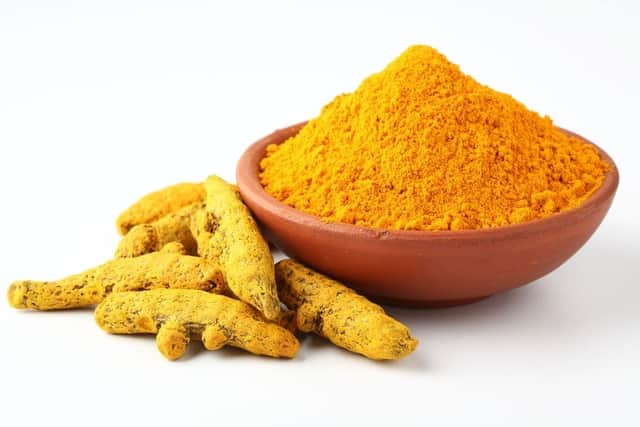Tucking into a curry can fight dementia


A key component in turmeric often used in curries helps improve both memory and mood in older people - and may keep dementia at bay, according to a new study.
Researchers found taking twice-daily curcumin supplements boosted cognitive power over 18 months in people over the age of 50.
Advertisement
Hide AdAdvertisement
Hide AdThe study showed daily consumption of a certain form of curcumin -- the substance that gives Indian curries their bright colour - improved memory and mood in people with mild, age-related memory loss.


The research, published online in the American Journal of Geriatric Psychiatry, examined the effects of an easily absorbed curcumin supplement on memory performance in people without dementia, as well as curcumin's potential impact on the microscopic plaques and tangles in the brains of people with Alzheimer's disease.
Found in turmeric, curcumin has previously been shown to have anti-inflammatory and antioxidant properties in lab studies.
It also has been suggested as a possible reason that senior citizens in India, where curcumin is a dietary staple, have a lower prevalence of Alzheimer's and better cognitive performance.
Shutterstock
Advertisement
Hide AdAdvertisement
Hide Ad

Reasons unlcear
Study first author Professor Gary Small, director of geriatric psychiatry at UCLA's Longevity Centre in the United States, said: "Exactly how curcumin exerts its effects is not certain, but it may be due to its ability to reduce brain inflammation, which has been linked to both Alzheimer's disease and major depression."
He said the study involved 40 adults between the ages of 50 and 90 who had mild memory complaints. The participants were randomly assigned to receive either a placebo or 90 milligrams of curcumin twice daily for 18 months.
All 40 received standardised cognitive assessments at the start of the study and at six-month intervals, and monitoring of curcumin levels in their blood at the start of the study and after 18 months.
Thirty of the volunteers underwent PET scans to determine the levels of amyloid and tau in their brains at the start of the study and after 18 months.
Advertisement
Hide AdAdvertisement
Hide AdThe findings showed that people who took curcumin experienced "significant" improvements in their memory and attention abilities, while the subjects who received the placebo did not,
Prof Small said that, in memory tests, the people taking curcumin improved by 28 per cent over the 18 months.
Those taking curcumin also had mild improvements in mood, and their brain PET scans showed significantly less amyloid and tau signals in the amygdala and hypothalamus than those who took placebos.
The amygdala and hypothalamus are regions of the brain that control several memory and emotional functions.
Advertisement
Hide AdAdvertisement
Hide AdSide effects
Prof Small said four people taking curcumin, and two taking placebos, experienced mild side effects such as abdominal pain and nausea.
Now the researchers are planning a follow-up study with a larger number of participants which will include some with mild depression so the scientists can explore whether curcumin also has antidepressant effects.
Prof Small said the larger sample would also allow them to analyse whether curcumin's memory-enhancing effects vary according to people's genetic risk for Alzheimer's, their age or the extent of their cognitive problems.
He added: "These results suggest that taking this relatively safe form of curcumin could provide meaningful cognitive benefits over the years."